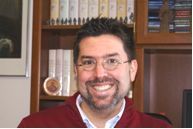I tend to read a lot in Church history... no big surprise there, I know, and some of my favorite authors come from a group known as the mystics. They seem to possess an extra, inner insight that allows them to probe deeply into the nature of Christ and His teachings. Some focused on living for Christ in eternity. Others on how Christ helps us to live more like Him on a daily basis. Jean-Pierre de Caussade was one of the latter. A French priest, he was very interested in how Jesus moves in and through us in the here and now, and he wrote a marvelous book detailing his thoughts on the matter called
The Sacrament of the Present Moment. I've a copy in my office if you'd ever like to borrow it.
Consider these two paragraphs, referring to the crucifixion:
"Everything in the present moment tends to draw us away from the path of love and passive obedience. It requires heroic courage and self-surrender to hold firmly to a simple faith and to keep singing the same tune confidently while grace itself seems to be singing a different one in another key, giving us the impression that we have been misled and are lost. But if only we have the courage to let the thunder, lightning, and storm rage, and to walk unfaltering in the path of love and obedience to the duty and demands of the present moment, we are emulating Jesus Himself. For we are sharing that passion during which our Savior walked with equal firmness and courage in the love of His Father and in obedience to His will, submitting to a treatment which seemed utterly opposed to the dignity of so holy a saint.
"Jesus and Mary, on that dark night, let the storm break over them, a deluge which, in apparent opposition to God's will, harms them. They march undaunted in the path of love and obedience, keeping their eyes on what they have to do, and leaving God to do what He will. They groan under the weight of the divine action, but do not falter or stop for a single moment, believing that all will be well providing they keep on their course and leave the rest to God."
Do you know the peace that allows you to keep your eyes on what you have to do, believing that all will be well? Do you trust that God will do what God does, and hear your prayers, provide for your needs, give you more grace, and continue to perfect you in faith?
Why not start right now, in whatever small things face you today. After all, if we want to glorify God in the big things, we need to be faithful in the little.







